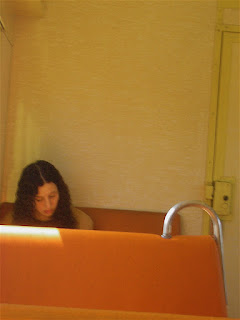
For Traditionalists
Clermont finds Thomas fascinated by a “wanted” poster – for an Englishman, naturally. I think he’s light on details because Paris is pulling him in. He’s seen carved birds, met pilgrims, enjoyed several active gallowes: but his most vivid description is of the countryside.
St Leu is a sleepy village on the Oise rive. The major hotel is on the river-bank and is tight with middle-age at lunchtimes: there are no rooms. My auberge is over the bridge; heads are more shaven here. “There are boats on the river?” I ask.
“Boats but for you no regatta.”
“Shame.”
“A shame for you, but not for us. Enjoy our little village monsieur.”

Street Theatre
There is a central square with a flourishing outdoor market, everything is cheap and the products local. Except the best thing, the grocer says, handing me a slice of melon from his home country of Morocco.
There is another huge church on the hill. From its grounds the view is across Oise country, and down to a Peter Greenaway set. There is only one mystery to St. Leu: why in a village of perhaps twenty shops, of which half a dozen are banks or building societies, are there four hairdressers within 100 metres of each other. Hair here seems no more special than Calais or Amiens.

For Victoria

For Peter Greenaway
There is absolutely no chance of internet access here, then I see a sign for a Mediatech (which is a library in a modern building plus a computer). Inside a lot of children rush about and take in the exhibit on “Europe”. It seems cruel to keep them from playing on the computers.
But hell, a man has to post.
Tonight is one of those spiritually enhancing European moments: the cup final of the Champions League, taking place this year between Milan and Liverpool – in Athens. I’ve watched football from all sorts of bars around the world: tonight it would not be right to lock-up in my room and watch alone. But where to go?
In the Auberge all is eating. In the market square a young man cycles around and around wearing a Jamiroquai hat. Towards the church – rien. And then, down a side street: two men in sportswear on mobile phones standing outside a gothic darkness. There is an open bar-tabac. I go inside.

Sarkozy Night Fever
The bar room is twice the size of my hotel room. That is, one quarter the size of shoe box. Nasty rap is playing from a computer. On stools at the bar are five Frenchmen, one black, four white, all of indeterminate age. “Monsiuer. Le Champions League. I can see it?”
All smiles: heterosexuality is “go.”
“A beer for monsieur.” Soon enough I even get my own stool, and the rap just fades away.
As in Picquigny everything is handshakes and politeness here. The more adventurous navigate the complexities of “Le Red Devils have spirit” & “Viva Les Anglais.” But most opt for the English approach.
“Ah, so you are Italian?” says the owner. “From Milano?” An elderly gentleman decides to spend the evening mangling the Italian language. Then the action begins. More people arrive, handshakes and kisses, but not from one young man.
He is ugly: a cross between the Liverpool footballers, Craig Bellamy and Peter Crouch – and not in a good way. He’s dressed for an audition of “O Brother, Where Art Thou,” and alternates drinking vodka and cokes with speeding around the tiny bar, checking his phone, and shouting out. The old men of the bar are wary. “Craig-Crouch” has attention deficit disorder I’d say. And no sense of personal space, he comes very close to gaze, as if I am an exhibit. Heaven forbid. When Milan score he comes to within a foot of my face and gives me the “Maradonna on Cocaine” shriek. Somebody tells him “no.”

Two new recruits at the Bovary Boot Camp
She arrives with her husband, an older man with suitable stomach. He immediately goes outside to talk turkey with the men. She has bunned-up hair, like a Victorian, it’s quite fancy – perhaps this is what takes all the time of the four hairdressers in the village. She’s attractive in flimsy black; one layer comes off straight away: there is a lot of tanned flesh around suddenly.
She talks to another woman at a table, but her body is seeking out Craig-Crouch. Soon she is between the compass of his Crouchy legs, her hands nowhere to be seen; his still fiddling with a mobile phone. She pow-wows with the woman, goes outside. Milan score again. “Pas finis, pas finis,” say my friends. It certainly isn’t: not with Madame Bovary de St. Leu in action.
Craig-Crouch speeds around the room, makes a call. When Emma B. returns he gets up, pays, and leaves. She is confused, finishes her mini-brandy, collects her over-skimpy. He comes back, still fiddling with his phone. “Let’s go,” he says. Liverpool score a consolation goal. But most of the significant scoring is in here.
“Next year,” says the owner. “Next year.” I shake a lot of hands again, but some familiar faces are missing.
Madame Bovary’s husband is gone when I get outside, Craig-Crouch and Madame Bovary too. In the market square the cycling Jamiroquai is still doing laps. He’ll need to find some steroids if he’s thinking of entering the Tour.
During a sunny birdsong of a morning the main question on the TV2 breakfast show is: “How will male sexuality evolve?”
In St. Leu I think we know the answer

Home and the Oise

















































